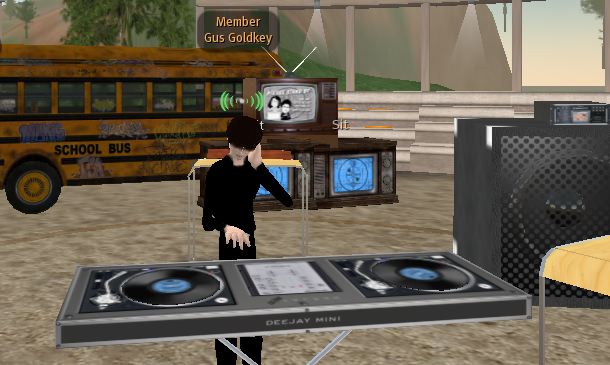
Image by Rob Kruyt
Nearly a decade ago, when we were planning our return to Canada after a couple of years living in Mexico, we had no idea where in our home and native land we might be able to settle. We had a Christmas visit back to British Columbia and Keira took me for my first walk along The Drive in Vancouver, a city that I had never felt comfortable with… I immediately grooved on the mix of cheap ethnic eats, the funky second-hand shops, the wild diversity of people strolling and lounging on the sidewalks. What appealed to me most was a certain down-market sensibility — prices were geared to people living on a budget, a Starbucks sat empty while an adjacent indie coffee shop had a line-up out the door. Grandview Park overflowed with buskers, bongo-banging hippies and black-clad anarchists throwing up funny anti-corporate posters everywhere. It felt like a world unto itself, and that day we resolved that we would live in this neighborhood. We did, and have never regretted the decision.
But in a pattern familiar to so many cities, the very qualities that made this place so dynamic have set forces in motion which endanger its vitality. The rents have gone up, driving out the Italian barbers and replacing them with hip kids clothing boutiques. The eateries, while often excellent, have been cycling steadily upscale. The people who have lived the longest in the neighborhood have been saying for some time that The Drive has lost its soul.
It felt like a kick in the gut when I read yesterday that the venerable magazine and bookstore Magpie was closing its doors. Magpie was one of the businesses that set the tone for The Drive, with a particularly fine selection of art-oriented and rabble-rousing political publications. Its proprietor, Kevin Potvin, was a controversial gadfly who leveraged his shop to launch The Republic of East Vancouver, a scrappy free newspaper with radical views and lots of local coverage.
Potvin largely blames changes in people’s media habits for the closing, and if I am honest I have to admit that with so much wonderful stuff available online I buy fewer magazines than I used to. The other factors in the closing I find more troubling. How is it that a vibrant, well-run and long-standing business is forced to finance with credit cards (especially strange given our current economic crisis brought on by imprudent lending to so many dubious borrowers)? And as Potvin implies, though in macroeconomic terms the city has been “booming,” for working people rising real estate values just mean higher rents and mortgage payments, which when added to skyrocketing food and fuel costs means that the squeeze is on.
Maybe that’s what’s troubling me most. I understand that in bad times, well, times are bad. But the triumphant common wisdom here in Vancouver is that we’ve enjoyed a decade of unprecedented good times, and we are soaring toward a coronation as a truly ‘world class’ city with the 2010 Olympics. The result is a sense of civic schizophrenia, where life gets tougher for those who don’t have a solid stake, where schools are closing, where community centres are cutting their programming, where small businesses can’t hack it… A high-profile and progressive-sounding mega-project destroys a neighborhood, and nobody is held accountable for the false promises that were made when it was being promoted. Cuts to services, but the money flows for every new Olympic cost overrun, for that fancy convention centre intended to impress visiting business people. (As an aside, is there any less pleasant place to gather and learn than every convention centre ever built? Why do people book events in these generic concrete crapboxes?)
We have a lot of friends who work in the community, and the stories they tell us of where things are headed on the street get darker and darker. I got the image above from a new blog by one of those friends, written under the nom de plume Hanna Mitchell. I’m really pleased she has joined the digital conversation. Here’s a sample portrait of this fair city, from the perspective of an artist and activist who has spent many years working with Vancouver’s most desperate people:
…we have created policy after policy that has kept the appearance of our neighborhoods as beautiful places for beautiful people, and anything or anyone that doesn’t fit that criteria gets torn down or comes to the Downtown Eastside. Homeless people aren’t just in the Downtown Eastside, and those walls are breaking, the walls that protect the beautiful and the young, and those who want to stay beautiful and young from the realities of the fragility of the lifestyle created here, a lifestyle that is beyond the means of most people that live here, a lifestyle that has neither style or substance, but is more like smoke and mirrors.
It is the mountains, the ocean, the cherry and magnolia trees, the people i know, and for the last 15 years, one of the greatest buildings in our City that keeps me here, so maybe i just feel duped because i fell for this beautiful place. I fell in love with this beautiful place, and now, not so much. I think she’s ugly on the inside, cold and a bit of a ditz, but still pretty. Not sure where this leaves me, but maybe its like a fight with someone you love, you have to tell them about the things that are bugging you, and hope they can change or that maybe you can live with who they are, or maybe you just leave.
Maybe leave. But I don’t know where else I can go…









